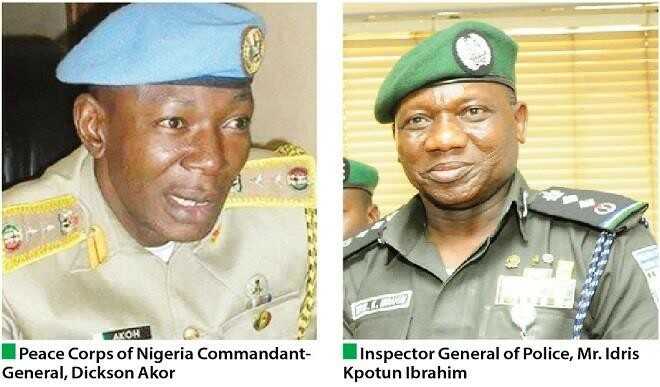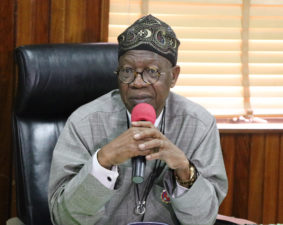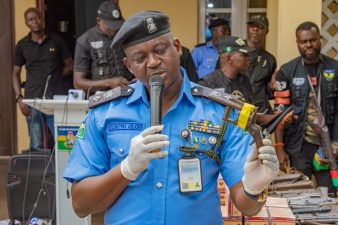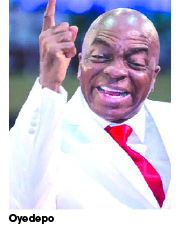At midnight, Tuesday, February 28, hours after the Minister of Youths and Sports, Solomon Dalung, commissioned the new offices of the Peace Corps of Nigeria close to Jabi Lake, Abuja, men of the Nigerian Police Force, the military and the Department of State Services (DSS) raided the building.
They arrested some 48 people, including Dickson Akoh, the Commandant of the Peace Corps of Nigeria. The 47 others arrested alongside him were members of the corps he established 18 years ago.
There were allegations of force being used, as Mr. Akoh would tell journalists after his release two days later. He said he was beaten and nursing mothers arrested along with him were denied access to their children until Thursday March 2, when they were freed.
The police said the raid was a crackdown on an illegal security outfit that is positioning itself to constitute security threat.
“For avoidance of doubt, the Peace Corps of Nigeria under the leadership of one Akoh Dickson was registered as an NGO but with brazen impunity, total disregard to the laws of the Federal Republic of Nigeria, opened illegal training camps in some states of the country, where thousands of youths and other persons without proper background check and screening are receiving covert military training,” Police Spokesman Jimoh Mashood said.
“Credible intelligence reports at the disposal of the Force revealed that some of these illegal Security outfits have started acquiring weapons and conducting covert military training in different locations across the country.”
The basis for the raid, the police said, was a 2013 Federal Gazzette proscribing the Peace Corps and other security outfits in the country.
“It is evident that in 2013, Federal Republic of Nigeria official Gazette dissolved and proscribed illegal Security outfits such as Nigerian Maritime Security Agency (NMSA), Nigerian Merchant Navy Corps and the Nigerian Merchant Navy Petroleum Security and Safety, Peace Corps of Nigeria and other quasi illegal security outfits,” Moshood said.
“The Corps,” Mr. Moshood added, “has no legal authority to wear uniform, parade itself as security outfit, post their personnel on guard duties, and use ranking, insignia, badges of rank which are semblance of that of the Police, Military and other paramilitary organizations without the approval of [the] Federal Government of Nigeria.”
“It is consequent upon the above and the veracity of intelligence reports from reliable sources, indicating that subversive elements/groups and terrorist affiliates have infiltrated the Peace Corps of Nigeria secretly to ruin and destroy the existing peace currently being enjoyed in the country that the Peace Corps of Nigeria secret training camps were closed down in the FCT, Kwara and Niger states,” he said.
The Peace Corps Commandant, Mr Akoh, denied the police allegation, saying they were operating within the law. “Our office was raided by people that should be enforcing the law. If law enforcement agencies could do what they did to us that day, then we shouldn’t blame armed robbers for invading homes.
“Despite securing 11 court judgments against them, law enforcement agencies could still go ahead to do what they did, then it is so unfortunate,” he said in an interview he granted to a newspaper which was also reported on the Corps’ website.
There was a bill passed into law by the National Assembly to legalize its operations which is presently awaiting presidential assent.
Sponsors of the bill have been outraged by the raid on the Peace Corp offices and have come out in its defence.
Former Senate Leader, Senator Ali Ndume thinks it is a supremacy battle and that the police, struggling with a battered reputation, feels threatened by the imminent arrival of a new security outfit.
“The Police went too far by arresting and parading the Peace Corps officials,” he said. “It’s not fair at all. But this is not the first time. It happened when the Road Safety and Civil Defence were at their ‘ conception stage’. It’s just rivalry and nothing more.”
“It [the Peace Corp] is not a new thing; it’s a United Nations recognized and accredited organization. This is why you will see the Corps officials wearing UN caps. Their aim is to promote peace among youth and it’s clearly spelt out in the bill we passed,” said the senator from Borno State.
Stressing his support for the Corps, Ndume said, “I will always support anything that will promote peace and create empowerment. For me, the Peace Corps, when legalized, will give our youth that are helpless, frustrated and angry, the sense of belonging and hope.”
When contacted, spokesman of the House of Reps, Abdulrazak Namdas (APC, Adamawa) said the National Assembly had worked on the Nigeria Peace Corps bill and that it is now awaiting presidential assent.
“The truth of the matter is that the National Assembly is aware of Peace Corps, because in the House of Reps, we passed the bill and it went to Senate for concurrence. A conference committee was constituted and the report was adopted in the House, so we can’t say we’re not aware of Peace Corps.”
Allegations of exploitation
However, one of the major allegations against the Peace Corps is the exploitation of these youths.
Findings by Daily Trust on Sunday show those enlisted in the corps have not been receiving salaries and the allegations of corruption and exploitation in enlisting people into the corps have been rife.
“During the preliminary investigation into the activities of the Peace Corps of Nigeria,” Police spokesman Mr Moshood said, “it was discovered that personnel of the Corps are extorting money from unwary youths throughout the country under the guise of recruitment. Amounts ranging from N50,000 to hundreds of thousands are being paid by innocent Nigerians to the Peace Corps of Nigeria. Once you pay the money, you are automatically recruited. Anyone who must have paid money under any pretence to the Peace Corps of Nigeria should report their case at the nearest Police Station in where they are across the country.”
Daily Trust has reliably gathered that there is substance to these allegations with a fee of N50,000 being collected by the corps for those hoping to be enlisted into its ranks. Recently, the corps has embarked on a massive recruitment programme in anticipation of the presidential assent that will give it legal backing.
One of the hopefuls who passed through the recruitment exercise said he bought an enlistment form for N1,500 and also paid N40,000 fees for training and kitting.
The young man who did not want to be named added that some of them who couldn’t provide their certificates of medical fitness were asked to pay N1,000 extra.
Another candidate from Benue State who also wouldn’t want his name mentioned said he even paid over N8,000 while in the training camps as extra expenses.
The man who said he purchased the enlistment form in Makurdi but had his training in Jos last September said they were not told how much they will receive as salary.
“Salaries were not discussed,” he said. “We are only hoping that the Act establishing the organisation will be passed so that we can start work because I have been home since then.”
More than 40,000 applicants were said to have been recruited, according to our findings. Their letter of “employment” a copy of which was obtained by Daily Trust on Sunday, said in part, “Following your performance, including medical, at the interview conducted for admittance into the staff officers’ cadre of this Organisation, we hereby notify you of your provisional enlistment, which you will be required to participate in a 4-week initial training and orientation.
“Admittance into the camp is subject to the payment of a highly subsidized camp registration fee of N40,000 payable at any branch of the Zenith Bank in favour of Peace Corps Nigeria, with Account No. 1014255246.
“Please note that the reason for payment of the above subsidised fee is due to the high number of youths absorbed into this Corps as a result of our commitment toward making our unemployed youths to be fully engaged.”
After being instructed in the letter that successful applicants should pay N40,000 for the camping, the same letter went further to add that: “Be informed that, the camp will be an open exercise; as such you are required to take care of your feeding and also come along with other necessary sporting wears.”
Allegations that the money generated from this exercise was used to lobby members of the National Assembly to pass the bill have also surfaced.
The source of funding for the Peace Corps has remained sketchy, as much as their activities. According to information contained on the PCN website, “To execute its programmes and activities, PCN depends on the following sources for funding: Donations from Local and International Donor Agencies; Grants for specific projects; Subventions from Governments and Private Corporations; Enlistments Fee; Identity Card Fees; Weekly Development Fee by Members; Camp Fees; Gifts and Bequest.”
When contacted about their activities, a member of the corps, who spoke on condition of anonymity, said the corps members have not received any salaries since they were employed and have mostly depended on handouts from the Corps Commandant, Mr. Akoh. The source also added that the corps is sometimes engaged in providing security at events, or public buildings for a fee. When these jobs are not available, they loiter in the offices all day.
Waiting for the law: The Bill that seeks to give the PCN legal backing
The Nigerian Peace Corps (NPC) Bill was sponsored by Senator Ali Ndume (APC, Borno South) at the Senate and Rep. Abdullahi Umar Faruk (APC, Jigawa) sponsored it at the House.
Senate Committee on Interior, chaired by Senator Bayero Nafada (APC, Gombe) and that of the House chaired Rep Adams Jagaba organised a public hearing on the bill where all stakeholders contributed to the moulding of the draft law.
The consideration of the report of the conference committee of both chambers of the National Assembly was listed on the order of the Senate on Thursday but it was however skipped.
The Bill
Comprising nine parts and 46 sections, the bill provides that the Nigerian Peace Corps (NPC) if established would empower, develop and provide alternative employment for the youths, facilitate peace, community service, nation-building and other related matters.
Section 1 (a) of the bill provides that the Nigeria Peace Corps, to be called Peace Corps, shall be a corporate body to sue and be sued, while (b) provides that its headquarters would be located in the Federal Capital Territory (FCT), Abuja with offices in the 36 states and 774 local governments of the federation.
Section 1 (9) of the bills states that “…the objectives of the Peace Corps shall be to train, educate and re-orientate the youth of this nation, particularly students, on their future leadership roles in the country with due respect to Constituted Authorities, democratic norms and the Rule of Law, and to redirect the productive energies of the youth toward the socioeconomic and political advancements of the nation.”
The bill, in Section 2, provides that the specific functions of the Peace Corps shall be to (a) promote social and economic development by involving members and volunteers in the scheme through working with government, schools, non-profit organizations, non-government organizations, etcetera in order to preoccupy the youth; (b) empower and preoccupy the Nigerian youths through jobs creation and provision of alternative employment; (c) train Nigerian youth with good virtuous, strong passion and commitment to the art of patriotism, community services and nation-building.”
It provides further that the corps would also (d) train and equip the youth with knowledge for peace education, conflict mediation, intervention, reconciliation and confidence building; (e) give distinct orientation to the youth and engage them in the provision of essential services…; (f) create a data bank and a reservoir of trained, qualified, professional and non-professional youths for easy accessibility of manpower….
Additionally, the corps is to provide security for all educational institutions and check all forms of examination malpractices and other vices prevalent in schools and colleges in order to create a conducive atmosphere for learning, as provided in subsection (g).
The corps will be headed by a National Commandant, while there will also be a governing board with a chairman and a representative from each of the ministries of youth development; labour, employment and productivity; environment and education as well as Institute for Peace and Conflict Resolution, National Orientation Agency (NOA), among others.
Duplcity of functions
However, Mr. Akoh denied allegations that they were undergoing secret military training.
“[The] court had already ruled on the issue of military training in 2011. Our activities do not touch on any classified military words. The concept of military training is armed. We don’t train on, or carry arms,” he said in an interview after his release.
However, Daily Trust on Sunday gathered that the security agencies were concerned over the duplicity of functions with the proliferation of security outfits, some of which are not professionally trained and do not have a clear mandate.
It was also gathered that some top security chiefs have queried the logic of establishing new security outfits when existing ones are not properly funded and do not have the required manpower to carry out their duties. The DSS went as far as submitting memoranda to the National Assembly not to give legal backing to the corps but lawmakers were swayed by the capacity of the corps to absorb the many unemployed youths in the country.
“Peace Corps will create thousands of jobs for the youth. So all this harassment by the police is unnecessary. It’s just an attempt to stop Peace Corps from coming on board,” the lawmaker who chose not to be named said.
Undeterred, the police is intent on pressing on with the prosecution of Dickson Akoh and his officers, as well as cracking down on other proscribed security outfits.
And Mr. Akoh too is determined to fight the police in the courts, this time without holding back punches.
“We will allow our lawyers to do the needful. When we won the case against them in 2011, we stopped our lawyers from enforcing the judgment, because, it’s the federal government that would pay the money and not the individuals who infringed on our rights. We won’t stop our lawyers this time.”
Though the PCN enjoys support from the National Assembly, it is clear that in view of the staggering allegations against it, this support may waver.
Responding to the allegations, Senator Ndume said, “Are they forcing people to pay? How much did Nigerians lose to MMM? They ran with billions. Did the police arrest any person in connection to MMM? This is the question.”
He, however, said he would withdraw his support to the organization if the police found it wanting.
“I will never stand by any group that is involved in criminality even if it is the Senate that I belong to. I won’t support it,” the senator said. (Daily Trust)




